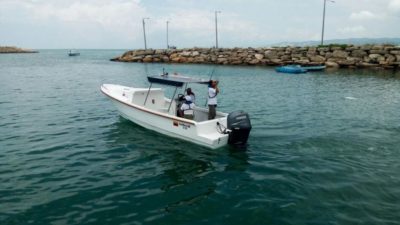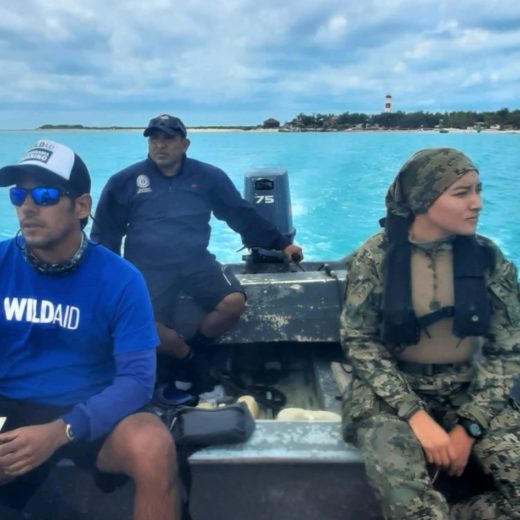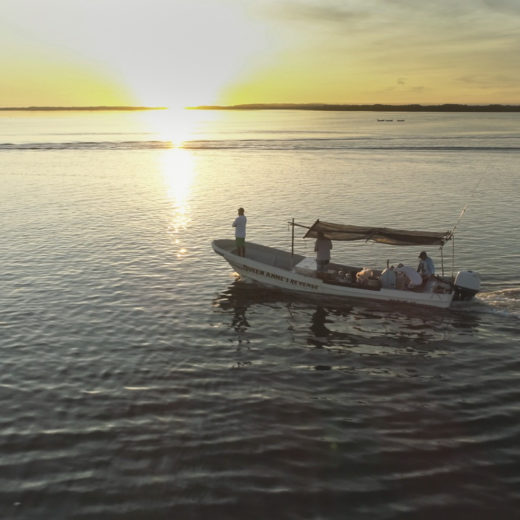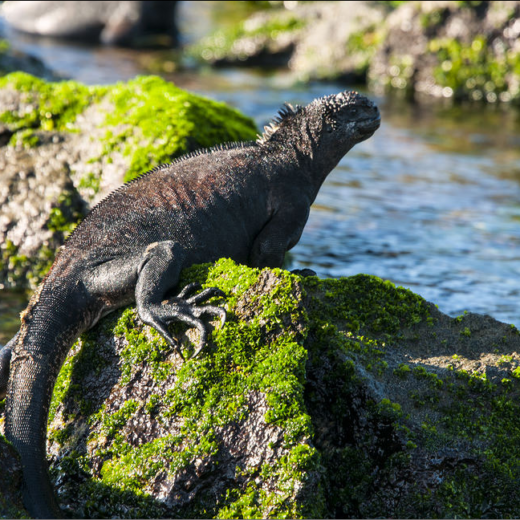
BY SILVIA SANCHEZ BOR, WILDAID MARINE PROGRAM
Isla de la Plata in Machalilla National Park has some of the most biodiverse and productive waters on Ecuador’s coast. Known for spectacular wildlife sightings including giant mantas, humpback whales, sharks and sea turtles, it is not uncommon to see tourist vessels taking visitors to the island by day and illegal fishing boats by night. WildAid assisted the park this month in acquiring a new patrol vessel to protect these waters from illegal fishing.
The Rangers at Machalilla risk their lives every day to patrol the waters surrounding Isla de la Plata, removing ghost nets (fishing nets that have been left or lost in the ocean by fishermen) to prevent accidental bycatch and intercepting illegal fishing. Additionally, the Rangers started a humpback whale rescue program to rescue whales entangled in illegal fishing gear, as well as a wildlife rehabilitation hospital to treat injured marine wildlife along the coast.
Last year, WildAid helped the Machalilla Park Rangers increase surveillance of the area by installing a long-range camera and AIS at Isla de la Plata. However, the Park Rangers only had access to one patrol boat to travel from the mainland control center to the island station. Thus, if surveillance equipment spotted illegal fishing activity near Isla de la Plata, a patrol boat could take up to three hours to intercept the fishers, who would be long-gone by then.
In response, WildAid procured a patrol vessel for use specifically at Isla de la Plata to ensure that Rangers stationed there had quick access to better intercept illegal fishers. In addition to its help in enforcement activities, the new vessel will be crucial for the expansion of the humpback whale rescue program. As the majority of humpback whales that visit this region of Ecuador congregate in the waters surrounding Isla de la Plata, the risk of encountering illegal fishing gear there is greater than closer to the mainland. Last year, Machalilla Park Rangers rescued five whales that had been entangled in fishing lines and nets and this year expect to increase rescues due to the new patrol vessel.
This work is part of a three-year project in Ecuador to reduce illegal fishing in six of its coastal marine protected areas. Our work includes a comprehensive marine protection plan for each site, support for regular patrols, surveillance equipment, training for Rangers and fisher/ community outreach.
WildAid has helped decrease illegal fishing on Ecuador’s coast since 2014 thanks to the support of the Sandler Foundation, Conservation International, the Walton Family Foundation, the Overbrook Foundation and the Stellar Blue Fund.
Español
Una Lancha de Patrullas para el Parque Nacional Machalilla en Ecuador
Isla de la Plata en el Parque Nacional Machalilla tiene unas de las más productivas y biodiversas aguas en la costa de Ecuador. Conocida por sus vistas de vida silvestre incluyendo mantarrayas gigantes, ballenas jorobadas, tiburones y tortugas marinas, es muy común ver embarcaciones turísticas durante el día y lanchas de pesca ilegales de noche. Este mes, WildAid consiguió una nueva lancha de patrullas para que el parque pueda mejor proteger sus aguas.
Los guardaparques en Machalilla ponen sus vidas en riesgo todos los días para patrullas los mares alrededor de Isla de la Plata, removiendo mallas de pesca para prevenir la pesca incidental e interceptando pesca ilegal. Adicionalmente, los guardaparques empezaron un programa de rescate de ballena para rescatar a las ballenas enredadas en las artes de pesca, al igual que un hospital de rehabilitación de vida silvestre marina.
El año pasado, WildAid ayudo con el monitoreo del área con la instalación de cámaras de largo alcance y un sistema de AIS en Isla de la Plata. Sin embargo, los guardparques solamente tenían acceso a una lancha para viajar desde el centro de control de Machalilla hacia el centro de control en Isla de la Plata. Entonces, si se encontraba actividad ilegal cerca de Isla de la Plata, podría tomar hasta tres horas para interceptar a los pescadores, cuales ya se hubiesen ido.
Para responder a esta necesidad, WildAid donó una lancha de patrulla para uso específicamente en Isla de la Plata para asegurar que los guardaparques estacionados allí puedan responder rápidamente a la actividad ilegal. Adicionalmente, la nueva embarcación, nombrada Megaptera en honor de las ballenas jorobadas, será utilizada para la expansión del programa de rescates de ballena. Como la mayoría de las ballenas que visitan esta región de Ecuador se congregan en las aguas alrededor de Isla de la Plata, el riesgo de encontrar artes de pesca allí es más alto que el riesgo cerca de la costa. El año pasado, los guardaparques rescataron cinco ballenas que habían estado enredadas en artes de pesca y esperan aumentar el número de rescates este año debido a la nueva lancha.
Este trabajo es parte de un proyecto en Ecuador para reducir la pesca ilegal en seis de sus áreas marinas protegidas costeras. Nuestro trabajo incluye un plan de protección marítima para cada sitio, apoyo para patrullas regulares, equipo de monitoreo, capacitación y educación comunitaria.
Gracias al apoyo del Sandler Foundation, Conservación International, el Walton Family Foundation, el Overbrook Foundation y el Stellar Blue Fund, WildAid ha trabajado en la costa de Ecuador desde el 2014 para reducir la pesca ilegal.
Stay in touch and get the latest WildAid updates.
SIGN UPAbout WildAid
WildAid is a non-profit organization with a mission to protect wildlife from illegal trade and other imminent threats. While most wildlife conservation groups focus on protecting animals from poaching, WildAid primarily works to reduce global consumption of wildlife products such as elephant ivory, rhino horn and shark fin soup. With an unrivaled portfolio of celebrity ambassadors and a global network of media partners, WildAid leverages more than $308 million in annual pro-bono media support with a simple message: When the Buying Stops, the Killing Can Too.
Journalists on deadline may email communications@wildaid.org


